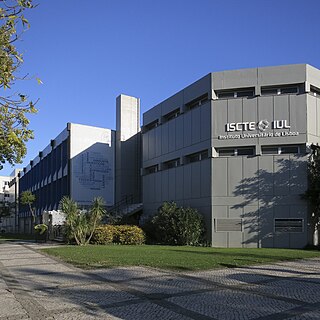
The University of Trás-os-Montes and Alto Douro is a public university located in the north-eastern city of Vila Real, Portugal.

The Instituto Superior Técnico is the school of engineering and technology of the University of Lisbon. It was founded as an autonomous school in 1911, and was integrated into the Technical University of Lisbon in 1930. IST is the largest school of engineering in Portugal by number of enrolled students, faculty size, scientific production and patents.
An institute of technology is an institution of tertiary education that specializes in engineering, technology, applied science, and natural sciences.

Education in Portugal is free and compulsory until the age of 18, when students usually complete their year 12. However, only one of those requirements is necessary. The education is regulated by the State through the Ministry of Education. There is a system of public education and also many private schools at all levels of education. The first Portuguese medieval universities, such as the University of Coimbra, were created in the 13th century, and the national higher education system is fully integrated into the European Higher Education Area.
The Instituto Politécnico do Porto, also referred to as Politécnico do Porto and P.PORTO, is a composition of multiple polytechnic schools based in Porto region. The Porto Polytechnic developed as a metropolitan institution with schools in Porto, Matosinhos, Póvoa de Varzim, Vila do Conde and Felgueiras.
The Polytechnical Institute of Coimbra is a public polytechnic institute of higher education in Coimbra, Portugal. It was created by decree of 1979, but its effective start up was only in 1988 through the creation and union of new and former schools. With an enrollment of 10,197 (2008) students, it is the third biggest polytechnic institute of Portugal.

The Instituto Superior de Engenharia de Coimbra(ISEC) is a higher education polytechnic institution of engineering, based in Coimbra, Portugal. It belongs to the Polytechnic Institute of Coimbra, although with a great level of administrative, financial, and pedagogic autonomy.
Instituto Industrial e Comercial de Lisboa was a former Portuguese school of vocational education founded in 1852 as Instituto Industrial de Lisboa, by Minister Fontes Pereira de Melo decree of 30 December. Its aim was the creation of a technical school of vocational education, whose purpose was to facilitate the ongoing industrialization process set up by Pereira de Melo. The education of a large number of skilled industrial technicians in several areas, was one among many innovative reforms Pereira de Melo idealized as Minister. This qualified workers were suited to deal with the new needs in industry.

The Ordem dos Engenheiros is the regulatory and licensing body for the engineering profession in Portugal. It is headquartered in Lisbon, and has several regional branches in other Portuguese cities.

Engineering education is the activity of teaching knowledge and principles to the professional practice of engineering. It includes an initial education, and any advanced education and specializations that follow. Engineering education is typically accompanied by additional postgraduate examinations and supervised training as the requirements for a professional engineering license. The length of education, and training to qualify as a basic professional engineer, is typically five years, with 15–20 years for an engineer who takes responsibility for major projects.
Higher education in Portugal is divided into two main subsystems: university and polytechnic education. It is provided in autonomous public and private universities, university institutes, polytechnic institutes and higher education institutions of other types.

Science and technology in Portugal is mainly conducted within a network of research and development (R&D) units belonging to public universities and state-managed autonomous research institutions. There are also non-state-run research institutions and some private R&D projects developed by companies.
The University of São Tomé and Príncipe, USTP, is a public institution of higher education in São Tomé and Príncipe. It is the main institution dedicated to teaching, research and university extension of the country. It was established in 2014 by merging three older institutions of higher education: ISP, EFOPE and ICS.
The Escola Superior Agrária de Coimbra (ESAC), in English the Agrarian School of Coimbra, is a state-run polytechnic higher education school of agriculture, based in Coimbra, Portugal. The oldest of the Coimbra Polytechnical Institute's (IPC) autonomous institutions, it has also IPC's largest campus.
Polytechnic is one of the two sub-systems of higher education of Portugal, the other being a university education. The polytechnic higher education focuses on providing more practical trainings and profession-oriented, while university education has a strong theoretical basis and highly research-oriented. Polytechnic institutions only grant licentiate's and master's degrees, as opposed to universities granting doctor's degrees.

ISCTE – Instituto Universitário de Lisboa is a Portuguese public tertiary education institution. It is located in the city centre of Lisbon, in Cidade Universitária, adjoining the Institute of Social Sciences (ICS) and Institute of Geography and Spatial Planning (IGOT) of the University of Lisbon. ISCTE was founded in 1972, starting with three degrees and 296 students. Formerly called Instituto Superior de Ciências do Trabalho e da Empresa, its full name was dropped in 2009 when it became a university institute of foundational nature.
Nuno Miguel Fonseca Ferreira is the current president of ISEC "Coimbra Institute of Engineering". Nuno Ferreira formally took office April 13, 2010, succeeding Jorge Bernardino. Ferreira's official inauguration celebrations took place at the principal auditorium at 16:30. He was received with high expectations being a former alumni of ISEC.

Centro Universitário da FEI is a higher education facility in São Bernardo do Campo, Brazil, offering undergraduate degrees in engineering, business administration, and computer sciences as well as master's degrees in mechanical engineering, electrical engineering, and administration; specialization courses are also offered. It is often ranked among the best Brazilian private engineering colleges and best overall in mechanical engineering, electrical engineering, and computer science.










